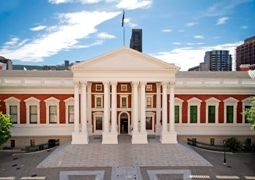
The morning session of day two of the National Council of Provinces (NCOP) workshop on Cooperative Governance and Intergovernmental Relations focused on intergovernmental Relations and the fiscal framework, as well as the codification of cooperative governance and intergovernmental relations in the delivery of services to communities.
South Africa’s Auditor-General Ms Tsakani Maluleke, Professor Bertus de Villiers from the University of Johannesburg, Ms Wendy Fanoe from the National Treasury and Dr Thina Nzo from the Public Affairs Institute led the discussion.
Ms Maluleke was the first to present on Intergovernmental Relations and Fiscal Framework: Coherence and Meaning to the Financial Oversight Role of Parliament in audit outcomes and public resource management. She raised the issue of the poor financial health of local government, the inability to manage funds and generate revenue.
“That which is available is not managed properly. How can we together strengthen accountability in our country?” she asked. She also told the workshop that despite her office’s warnings about deterioration of accountability in local government, there was little evidence of the messages receiving the required attention.
The audit outcomes demonstrate an overall regression over the period of this administration. “We continue to see a deterioration in the financial health of municipalities and a lack of consequences. The poor state of financial and performance management indicates that our recommendations remain unheeded, in direct contrast to the concepts of public interest and accountability entrenched in our country’s Constitution and the legislation that governs local government,” the Auditor-General said.
She advised the NCOP to insist, during oversight, on ethical leadership, good governance and accountability, as well as encourage stable administration which is free from political interference. “The NCOP must also ensure that there is strong control environment with strong internal controls that prevent financial loss, and consistent, appropriate and swift consequences for accountability failures,” Ms Maluleke said.
Prof De Villiers said the NCOP had an important role to play in cooperative government and intergovernmental relations. “The NCOP is the link within the cooperative governance system. However, the NCOP has not yet come to the standard designed for it by the Constitution. Political reasons are why the NCOP has not been a vocal voice for the provinces and ensure that whatever national standards are designed at national level they can be implemented at local level,” Prof De Villiers said.
However, he added, there is no reason to despair because “intergovernmental relations are never perfect, but always work in progress”.
The workshop also heard that South Africa has managed to establish some of the best governance structures since 1994, however they were not functioning efficiently to meet the intended objectives.

